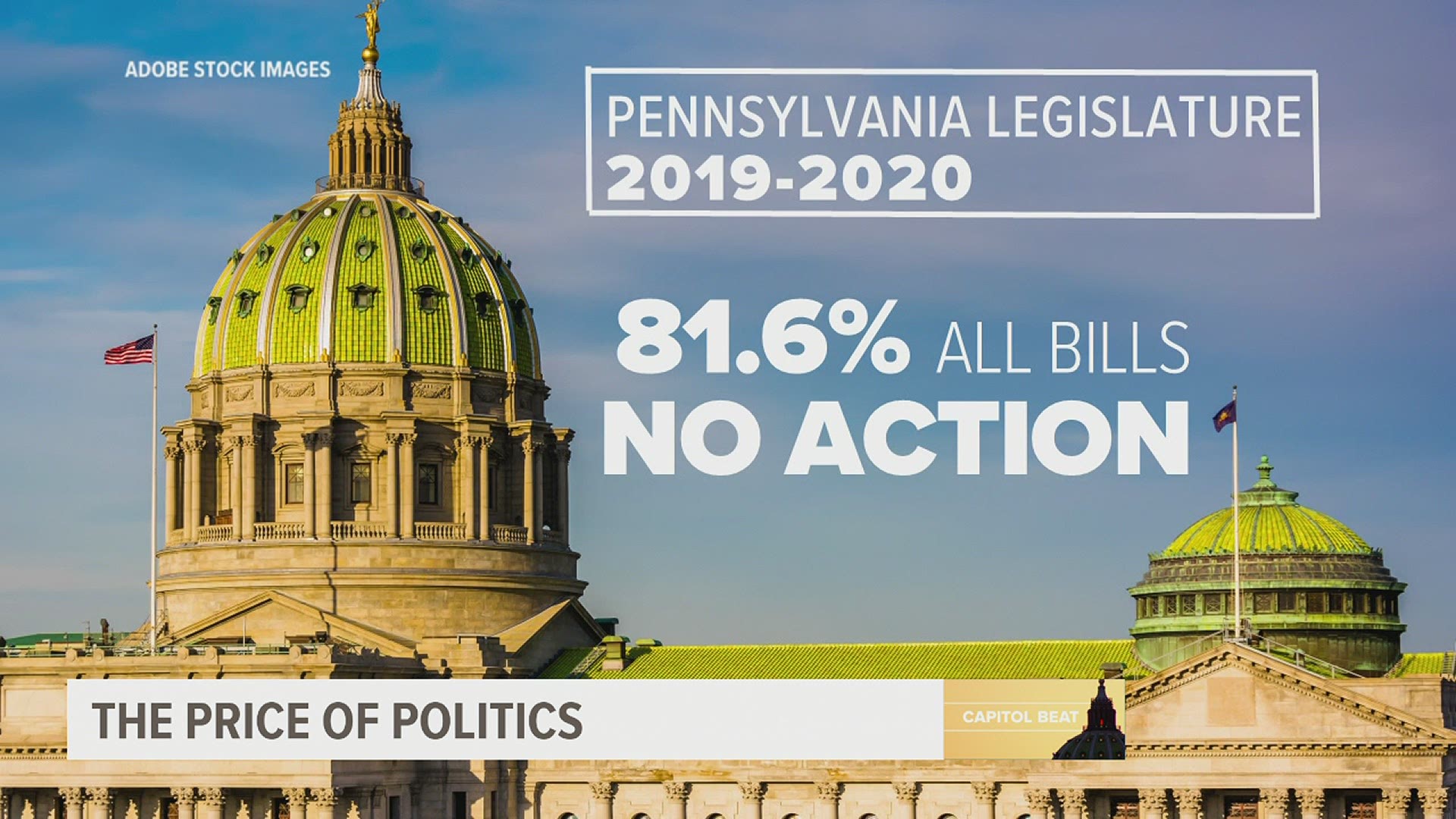HARRISBURG, Pa. — At a time when Pennsylvanians relied on their government more than at any point in recent history, its largest full-time legislature in the country failed to address more than 80% of the bills that came their way.
During the General Assembly's two-year 2019-2020 session, state representatives and senators wrote 4,198 bills. It was the most legislation written by the Commonwealth's General Assembly since the end of the Rendell Administration.
Much of it was largely ignored.
A FOX43 Capitol Beat investigation reviewed the nearly 4,200 pieces of legislation brought forward by lawmakers last session, and found 3,428 bills -- more than 81.5% between the House and Senate chamber -- never left the initial committees of which they were introduced.
"On the one hand, it's frustrating as a legislator," State Representative Andrew Lewis (R-Dauphin) said. Lewis entered the State House in 2018, and like many freshman lawmakers, came into the General Assembly optimistic and ready to make a difference. Most notably, he introduced a bill to create term limits for legislators, and thought an idea with bipartisan support would surely gain traction with his Republican majority colleagues.
Lewis soon realized getting bills passed in Harrisburg is easier said than done. His bill to create term limits never had a hearing or was put up for a vote in the committee of which it was assigned.
"It's frustrating to see that I've introduced this bill and it still has not gotten through, and I think it's a great idea," Lewis said. "But on the other hand, I recognize there are a lot of bad ideas that haven't come through too."
Lewis' latest proposal addresses public utility costs for fire companies and emergency units.
"For a simple bill like this one that helps our fire companies, this should only be a couple weeks until it's introduced and referred to committee and we're able to consider it," Lewis said.
The bill was introduced to the legislature on April 12. By May 23, it still has not been officially assigned a bill number and assigned a committee.
Of the 4,198 bills introduced over the last two years, 311 ultimately made their way through the legislature, with 290 being signed by Governor Tom Wolf. He also vetoed 21 bills in that time, including 17 in 2020 alone. The majority of the governor's vetoes -- 13 -- concerned the COVID-19 pandemic.
Of the bills which the governor did sign, a FOX43 review counted 22 addressing pandemic relief. However, over 30 of the bills were also budget-related, and are annual cash directives. There were also nine bridge namings and nine land deals among the new acts.
"It's not really about quantity, it should be about quality," Senate President Pro Tempore Jake Corman (R-Mifflin) said. "That's what people in Pennsylvania care about. They don't care about if I pass 500 bills with my name on it. They could care less about that."
Pennsylvania's 253-person legislature -- 203 state representatives and 50 senators -- is the largest full-time body in the country. When a legislator is elected, they start with a base salary of $90,335, the third highest starting salary in the nation behind New York and California.
Critics have called the legislature's methods ineffective. Advocates, like Corman, or even Lewis, say this is the system the Commonwealth's founding fathers left.
"The process is intentionally designed to take time, so there wasn’t this massive rapid passage of bills that clutter up government and make people‘s lives miserable," Lewis said.
However, what some wonder is, can more get done without making government bigger than it already is? The trends go back to the Rendell years.
In the 2017-18 session, the legislature did not address 79.4 percent (3,143 of 3,954) of all bills. In Governor Tom Wolf's first session, 2015-16, which featured a contentious budget battle, 81.2 percent of all legislation (3,055 of 3,759) was not considered.
It is not an issue of split government either. In 2013-14, when Republicans held a trifecta with Tom Corbett as governor, the GOP failed to act on 81.5% of all bills.
"I don't think many Pennsylvanians would think they get good bang for their buck," Nathan Benefield the Commonwealth Foundation said.

